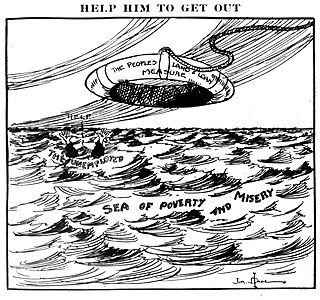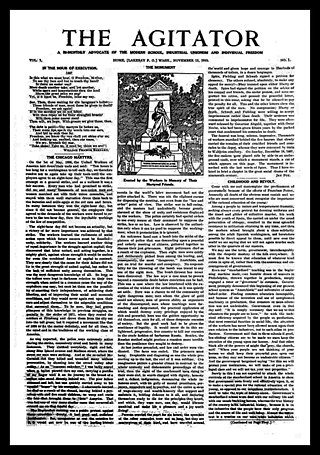
The Industrial Workers of the World (IWW), nicknamed "Wobblies", is an international labor union founded in Chicago in 1905. The nickname's origin is uncertain. Its ideology combines general unionism with industrial unionism, as it is a general union, subdivided between the various industries which employ its members. The philosophy and tactics of the IWW are described as "revolutionary industrial unionism", with ties to socialist, syndicalist, and anarchist labor movements.

The Freedom Socialist Party is a left-wing socialist political party with a revolutionary feminist philosophy based in the United States. It views the struggles of women and minorities as part of the struggle of the working class. It emerged from a split in the United States Socialist Workers Party in 1966. The party's Seattle branch, with support from individuals in other cities, split off from the SWP over what it described as the SWP's entrenched opportunism and undemocratic methods. The party has branches and members in the United States, as well as Australia, England, Germany and New Zealand. The current National Secretary of the FSP is Doug Barnes.

The Seattle General Strike was a five-day general work stoppage by 65,000 workers in the city of Seattle, Washington from February 6 to 11, 1919. The goal was to support shipyard workers in several unions who were locked out of their jobs when they tried to strike for higher wages. Most other local unions joined the walk-out, including members of the American Federation of Labor (AFL) and the Industrial Workers of the World (IWW). The national offices of the AFL unions were opposed to the shutdown. Local, state and federal government officials, the press, and much of the public viewed the strike as a radical attempt to subvert American institutions.
Radical Women (RW) is a socialist feminist grassroots activist organization affiliated with the Freedom Socialist Party. It has branches in Seattle, Washington, and Melbourne, Australia.

The 1934 West Coast Waterfront Strike lasted 83 days, and began on May 9, 1934, when longshoremen in every US West Coast port walked out. Organized by the International Longshore and Warehouse Union (ILWU), the strike peaked with the death of two workers on "Bloody Thursday" and the San Francisco General Strike which stopped all work in the major port city for four days and led ultimately to the settlement of the West Coast Longshoremen's Strike.
The Seattle Civil Rights and Labor History Project, one of the Pacific Northwest Labor and Civil Rights History Projects, is dedicated to social movements and labor history in the Pacific Northwest. It is directed by Professor James N. Gregory of the University of Washington. The project represents a unique collaboration between community organizations and University faculty, as well as undergraduate and graduate students. It has become a model of public history across the US and has been credited with changing the discussion of race and civil rights in the Seattle area.

The Northwest Labor Press is a newspaper which covers the American labor movement in the Pacific Northwest. It was known as the Portland Labor Press from 1900 to 1915, the Oregon Labor Press until 1986, and by its present name since then.

Erwin Bratton "Harry" Ault (1883–1961) was an American socialist and trade union activist. He is best remembered as the editor of the Seattle Union Record, the long-running labor weekly published from 1912 to 1928. After termination of the Union Record, Ault worked as a commercial printer for a number of years, before being appointed a deputy U.S. Marshal for Tacoma, Washington, a position which he retained for 15 years.
The Waterfront Workers History Project is a program of the University of Washington, which serves to document the history of workers and unions active on the ports, inland waterways, fisheries, canneries, and other waterfront industries of the western United States and Canada, specifically, California, Oregon, Washington, Alaska, and British Columbia. In collaboration with the Pacific Northwest Labor and Civil Rights History Projects, and sponsored by the Harry Bridges Center for Labor Studies, the Project is a collective effort to organize and present historical data covering significant events from 1894 to the current day.
The Great Depression in Washington State Project is a multimedia web resource based at the University of Washington in Seattle. Created in the context of renewed economic hard times in 2009, the Project includes essays, maps, digitized newspaper articles and hundreds of rare photographs from the 1930s. In addition to rapid industrialization and demographic change, the Depression ended decades of Republican rule, created a powerful labor movement, changed the face of the Democratic Party and molded new set of political priorities. In several thematic sections, the Project examines these changes in everyday life, culture, politics and work. The Project is one of the Pacific Northwest Labor and Civil Rights History Projects, characterized by student-led research and public scholarship.
The Seattle General Strike Project is a multimedia initiative to chronicle the Seattle General Strike. In February 1919, what began as a wage dispute in the city’s shipyard expanded into a week-long walkout involving more than 50,000 workers that heralded a wave of post-war labor unrest and America’s first red scare. The website maintained by the project is one of the foremost collections of primary and academic material on the general strike, and is part of the Pacific Northwest Labor and Civil Rights History Projects program at the University of Washington.
The Black Panther Party History and Memory Project is a multimedia effort to chronicle the Seattle chapter of the Black Panther Party. Founded in 1968, the Seattle Chapter was one of the first to be formed outside Oakland and became one of longest lived bases of the Party. The Project is the largest online collection of materials about any branch of the organization. The materials include detailed video oral histories, historical documents and photographs and the complete transcript of a 1970 Congressional Hearing held on the Seattle Chapter. The Project is an initiative of the Seattle Civil Rights and Labor History Project at the University of Washington.
The Pacific Northwest Labor and Civil Rights History Projects are a series of multimedia public history initiatives. The projects cover a range of themes and subjects in the Northwest and Seattle, with a particular focus on working people and their movements. The effort, particularly the Seattle Civil Rights and Labor History Project, has garnered praise for the breadth of primary and secondary resources made available and its joint creation by academics, community members and hundreds of students. It has been recognized as a model of digital and publicly engaged scholarship.
Strikes! Labor History Encyclopedia of the Pacific Northwest is a clearinghouse of information on the labor history of the region developed by the University of Washington and Professor James N. Gregory as part of the Pacific Northwest Labor and Civil Rights History Projects. The Encyclopedia covers the major industries of Washington state, major unions and worker struggles, civil rights activism among many ethnic communities, radical organizations, the Great Depression and the New Deal and the region's rich history of labor and radical newspapers.
The 1935 Pacific Northwest lumber strike was an industry-wide labor strike organized by the Northwest Council of Sawmill and Timber Workers Union (STWU). The strike lasted for more than three and a half months and paralyzed much of the lumber industry in Northern California, Oregon and Washington state. Although the striking workers only achieved part of their demands, the repercussions of the long and often violent strike were felt for decades. Over the next several years, a newly radicalized and militant generation of lumber workers would go on to spark several more industry-wide strikes.

The 1936 Seattle Post-Intelligencer Strike was a labor strike that took place between August 19 and November 29, 1936. It started as the result of two senior staff members being fired after forming an alliance and joining The Newspaper Guild. The strike halted production of the newspaper for the duration of the strike. The strike ended with a formal recognition of The Newspaper Guild.

The Agitator was a radical newspaper published by Jay Fox of the anarchist Home Colony in the American state of Washington from 1910 to 1912.
African-American socialism is a political current that emerged in the nineteenth century, specifically referring to the origins and proliferation of Marxist ideologies among African-Americans for whom socialism represents a potential for equal class status, humane treatment as laborers, and a means of dismantling American capitalism. Black liberation is in line with Marxist theory, which asserts that the working class, regardless of race, has a common interest against the bourgeoisie.

Megan Cornish is an American socialist feminist and labor activist with the Freedom Socialist Party (FSP) and Radical Women, as well as a retired electrician with Seattle City Light. Cornish became an electrician after participating in an affirmative action program in 1974. Much of her activism work has focused on fighting workplace discrimination at Seattle City Light.

Hildreth (Heidi) Durham was an American socialist feminist and labor activist with the Freedom Socialist Party and Radical Women. Durham was one of the first female electricians to work at Seattle City Light, where she faced significant barriers due to pervasive sexism and suffered a nearly fatal accident that left her paralyzed for the rest of her life. In 1991, Durham was a candidate in the Seattle City Council elections on the Freedom Socialist Party ticket with Yolanda Alaniz.









